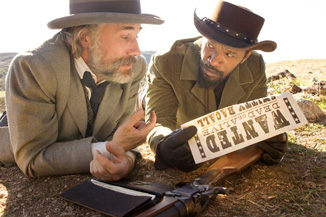|
|
2013 Calvin Awards: Best ScreenplayBy Reagen SulewskiFebruary 22, 2013
This year's top screenplays, as voted by us, run the gamut of crackerjack storytelling, historical dramas loaded with symbolic meaning, riveting dialog, to quirky personal stories that really came alive thanks to the care invested in the writing. While flash and style may rule the box office today, it's still nothing without the words to start it off.
Fifth spot goes to Silver Linings Playbook, from David O. Russell. His story of broken and breaking obsessive people finding each other to heal themselves succeeds through excellent characterization and finding the comedic and romantic potential in all these offbeat individuals. I mean, we knew he had an absurd streak, but who knew he was actually funny? Sixth place has Chris Terrio's script for Argo, which harkens back to some of the best international thriller scripts of all time for its tightly paced story of Americans attempting to escape Iran during the 1979 hostage crisis. Interweaving stories happening in three separate locations simultaneously, it drove the crisis home on a personal level as well as being exhilarating storytelling. Look, we don't wanna hear about it, Okay? The Avengers is *so* great scripting, from its witty dialog, logically progressing action scenes and brilliant characterization. Call us Joss Whedon fanboys if you must (and honestly, how could we consider it an insult?) but The Avengers had enough script for four movies (hear that Peter Jackson?) and used it to perfection. The Perks of Being a Wallflower probably suffered a bit from not being seen by all of our voters, but those that did recognized the brilliance of Stephen Chobsky's script, which elevated above the typical teen angst drama, pulling together separate strands of heartbreak and friendship into a devastating reveal. This is one of the year's undiscovered gems. Sometimes we just want to laugh hysterically and not stop for 90 minutes. Seth McFarlane's script for Ted delivered that, with laughs coming so quickly that we barely had time to process them. Was it kind of his shtick? Sure. But it's great shtick. Finally, tenth spot gives us John Gatins' script for Flight. Dealing with the aftermath of a plane crash and the condition of its pilot, it was an unflinching look into the darkness of alcoholism and hero worship. View other awards Calvins Intro Best Actor Best Actress Best Album Best Cast Best Character Best Director Best Overlooked Film Best Picture Best Scene Best Screenplay Best Supporting Actor Best Supporting Actress Best TV Show Best Use of Music Best Videogame Breakthrough Performance Worst Performance Worst Picture
|
|||||||||||||||||||||||||||||||||||||||||||||||||||||||||||

|
|
|

|
Thursday, October 31, 2024
© 2024 Box Office Prophets, a division of One Of Us, Inc.


